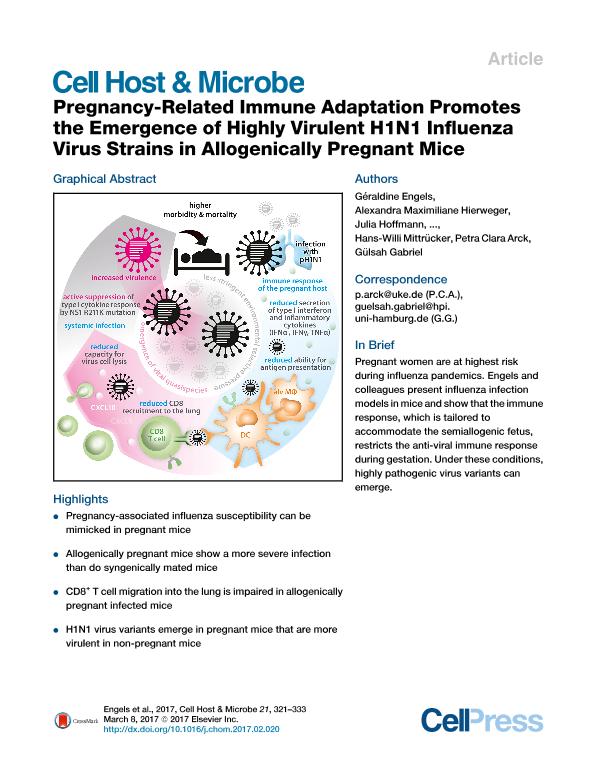Mostrar el registro sencillo del ítem
dc.contributor.author
Engels, Géraldine
dc.contributor.author
Hierweger, Alexandra Maximiliane
dc.contributor.author
Hoffmann, Julia
dc.contributor.author
Thieme, René
dc.contributor.author
Thiele, Swantje
dc.contributor.author
Bertram, Stephanie
dc.contributor.author
Dreier, Carola
dc.contributor.author
Resa-Infante, Patricia
dc.contributor.author
Jacobsen, Henning
dc.contributor.author
Thiele, Kristin
dc.contributor.author
Alawi, Malik
dc.contributor.author
Indenbirken, Daniela
dc.contributor.author
Grundhoff, Adam
dc.contributor.author
Siebels, Svenja
dc.contributor.author
Fischer, Nicole
dc.contributor.author
Stojanovska, Violeta
dc.contributor.author
Muzzio, Damián Oscar

dc.contributor.author
Jensen, Cristian Federico

dc.contributor.author
Karimi, Khalil
dc.contributor.author
Mittrücker, Hans-Willi
dc.contributor.author
Arck, Petra Clara
dc.contributor.author
Gabriel, Gülsah
dc.date.available
2019-08-30T17:15:21Z
dc.date.issued
2017-03
dc.identifier.citation
Engels, Géraldine; Hierweger, Alexandra Maximiliane; Hoffmann, Julia; Thieme, René; Thiele, Swantje; et al.; Pregnancy-Related Immune Adaptation Promotes the Emergence of Highly Virulent H1N1 Influenza Virus Strains in Allogenically Pregnant Mice; Cell Press; Cell Host & Microbe; 21; 3; 3-2017; 321-333
dc.identifier.issn
1931-3128
dc.identifier.uri
http://hdl.handle.net/11336/82594
dc.description.abstract
Pregnant women are at high risk for severe influenzadisease outcomes, yet insights into the underlyingmechanisms are limited. Here, we present models ofH1N1 infection in syngenic and allogenic pregnantmice; infection in the latter mirrors the severe courseof 2009 pandemic influenza in pregnant women. Wefound that the anti-viral immune response in the pregnanthost was significantly restricted as compared tothe non-pregnant host. This included a reduced type Iinterferon response as well as impaired migration ofCD8+ T cells into the lung. The multi-faceted failureto mount an anti-viral response in allogenic pregnantmice resulted in a less stringent selective environmentthat promoted the emergence of 2009 H1N1 virusvariants that specifically counteract type I interferonresponse and mediate increased viral pathogenicity.These insights underscore the importance of influenzavaccination compliance in pregnant womenand may open novel therapeutic avenues.
dc.format
application/pdf
dc.language.iso
eng
dc.publisher
Cell Press

dc.rights
info:eu-repo/semantics/openAccess
dc.rights.uri
https://creativecommons.org/licenses/by-nc-sa/2.5/ar/
dc.subject
Allogenic Mating
dc.subject
Influenza
dc.subject
Leukocyte Homing
dc.subject
Mice
dc.subject
Ns1 R211k Mutation
dc.subject
Pandemic
dc.subject
Pregnancy
dc.subject
Progesterone
dc.subject
Type I Response
dc.subject
Viral Quasi Species
dc.subject.classification
Inmunología

dc.subject.classification
Medicina Básica

dc.subject.classification
CIENCIAS MÉDICAS Y DE LA SALUD

dc.title
Pregnancy-Related Immune Adaptation Promotes the Emergence of Highly Virulent H1N1 Influenza Virus Strains in Allogenically Pregnant Mice
dc.type
info:eu-repo/semantics/article
dc.type
info:ar-repo/semantics/artículo
dc.type
info:eu-repo/semantics/publishedVersion
dc.date.updated
2019-08-30T14:17:05Z
dc.journal.volume
21
dc.journal.number
3
dc.journal.pagination
321-333
dc.journal.pais
Estados Unidos

dc.description.fil
Fil: Engels, Géraldine. University Medical Center Hamburg-Eppendorf; Alemania. Leibniz Institut Für Experimentelle Virologie; Alemania
dc.description.fil
Fil: Hierweger, Alexandra Maximiliane. University Medical Center Hamburg-Eppendorf; Alemania
dc.description.fil
Fil: Hoffmann, Julia. Leibniz Institut Für Experimentelle Virologie; Alemania
dc.description.fil
Fil: Thieme, René. University Medical Center Hamburg-Eppendorf; Alemania
dc.description.fil
Fil: Thiele, Swantje. Leibniz Institut Für Experimentelle Virologie; Alemania
dc.description.fil
Fil: Bertram, Stephanie. Leibniz Institut Für Experimentelle Virologie; Alemania
dc.description.fil
Fil: Dreier, Carola. Leibniz Institut Für Experimentelle Virologie; Alemania
dc.description.fil
Fil: Resa-Infante, Patricia. Leibniz Institut Für Experimentelle Virologie; Alemania
dc.description.fil
Fil: Jacobsen, Henning. Leibniz Institut Für Experimentelle Virologie; Alemania
dc.description.fil
Fil: Thiele, Kristin. University Medical Center Hamburg-Eppendorf; Alemania
dc.description.fil
Fil: Alawi, Malik. Leibniz Institut Für Experimentelle Virologie; Alemania
dc.description.fil
Fil: Indenbirken, Daniela. Leibniz Institut Für Experimentelle Virologie; Alemania
dc.description.fil
Fil: Grundhoff, Adam. Leibniz Institut Für Experimentelle Virologie; Alemania
dc.description.fil
Fil: Siebels, Svenja. University Medical Center Hamburg-Eppendorf; Alemania
dc.description.fil
Fil: Fischer, Nicole. University Medical Center Hamburg-Eppendorf; Alemania
dc.description.fil
Fil: Stojanovska, Violeta. University of Groningen; Países Bajos
dc.description.fil
Fil: Muzzio, Damián Oscar. University of Greifswald; Alemania
dc.description.fil
Fil: Jensen, Cristian Federico. University of Greifswald; Alemania. Consejo Nacional de Investigaciones Científicas y Técnicas. Oficina de Coordinación Administrativa Houssay. Centro de Estudios Farmacológicos y Botánicos. Universidad de Buenos Aires. Facultad de Medicina. Centro de Estudios Farmacológicos y Botánicos; Argentina
dc.description.fil
Fil: Karimi, Khalil. University Medical Center Hamburg-Eppendorf; Alemania
dc.description.fil
Fil: Mittrücker, Hans-Willi. University Medical Center Hamburg-Eppendorf; Alemania
dc.description.fil
Fil: Arck, Petra Clara. University Medical Center Hamburg-Eppendorf; Alemania
dc.description.fil
Fil: Gabriel, Gülsah. Leibniz Institut Für Experimentelle Virologie; Alemania
dc.journal.title
Cell Host & Microbe

dc.relation.alternativeid
info:eu-repo/semantics/altIdentifier/doi/http://dx.doi.org/10.1016/j.chom.2017.02.020
dc.relation.alternativeid
info:eu-repo/semantics/altIdentifier/url/https://www.sciencedirect.com/science/article/pii/S1931312817300823
Archivos asociados
